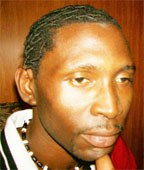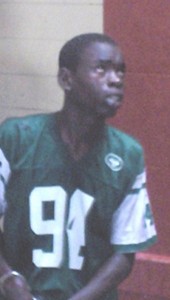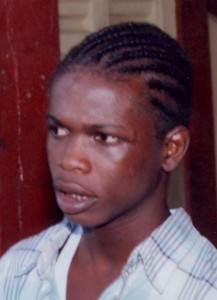– sociologist explores
By Iana Seales
Discourse on the declining male leadership in homes is a ‘hot’ topic especially in a country where child deliquents are increasing every year and too many fall at the hands of law enforcement in a vicious cycle of rebellion, gang recruitment and deadly confrontation.
In the last few years Guyana has recorded the names of boys, still too young to vote, on its register of notorious criminals: Otis Fifee (Mud up), Robin Chung (Chung Boy), Kwesi Lewis, Aubrey Glasgow, Anthony Hyles, Jermaine Charles (Skinny) and Nasty Man [still too young to be named] among a string of others.
The snippets of their lives exposed in the press barely scratch the surface of the environment they grew up in. Rarely if ever is anything heard of their fathers, and whether any among them even knew the men who fathered them.

Where are the fathers, many repeatedly asked when the bullet-riddled bodies of Fifee and Chung were flown out of Christmas Falls and Goat Farm and prior to this, when ‘Skinny’ and ‘Nasty Man’ were named among the accused in heinous multiple-murders, including the execution of the five Kaieteur News pressmen two years ago.
The image of an unkempt ‘Nasty Man’ standing in court looking like a child desperately in need of care is still etched in the minds of many who expressed outrage and concern, but perhaps even more startling was his nonchalant response to that burning question – where are your parents?
“I don’t know my father and my mother in the islands,” the child told the magistrate, coldly indifferent.
As for ‘Skinny’, his long rap sheet prompts questions about his childhood in Agricola. Interestingly at one time he knew the love of both parents but as his mother recently revealed in an interview with this newspaper, his father died while he was still young. University of Guyana sociologist Andrew Hicks believes that the absence of fathers in homes creates all kinds of vulnerabilities given that both parents enforce value systems. He said that a significant number of fatherless children look to peers and pointed out that the peer culture contradicts the family culture, adding that in some instances the peer culture is a gang culture.

Though he acknowledged that a number of single parent households have turned out well-adjusted adults, Hicks said too many young men were starved of a father. He asserted that the lack of a male role model in homes was a critical issue because for most children men still represented the traditional definition of authority.
Fredrick Cox of the Guyana Responsible Parent-hood Association (GRPA) said the myriad challenges of everyday life take a toll on many men who bow out feeling pressured, and in other instances, they just leave because they want to. He said too that there is a growing number of independent women with earning power who are standing up and questioning decisions in the home. This has not gone down well with some men so they opt out of the relationship leaving their children without a “most needed father figure”.
Signs of rebellion
Otis Fifee’s father walked out on him when he was a few months old, bluntly telling his mother Wendy that it was no longer working out between them; he had also found a new love interest. She already had a son whose father also left within a few months and Wendy was left to raise the two boys on her own.
When Stabroek News journeyed to Buxton a short while ago, a tired looking Wendy decided to open up about her son, telling us that she raised him and four others on her own since no man she had ever met wanted to stick around long enough to see their children grow up. But she pointed out that they were all healthy and were doing well except for Otis who she had to bury recently.
“Otis out of control for a long while. I couldn’t handle he, nobody around me could handle he. After a while I didn’t even know he anymore but ah love me son and at times I think he use to settle down because I didn’t turn me back,” the woman said teary-eyed.

She said he grew up with a temper and from an early age started rebelling. He spent one year in secondary school and left after countless fights and bitter encounters with his teachers. He passed the next few years hanging around shady characters in the village and then just picked up and left one day without saying a word about where he was going.
Was he involved in crime? Wendy would not swear that he was not but she felt he had been influenced. She said the only men in Otis’ life were the ones hanging with him on the street corner and they were the ones he warmed up to eventually. The mother said she got her older sister to discipline him whenever they managed to catch him but after a while, he was just not around. She admitted that he had once sought refuge in the cane-fields aback of Buxton and he spent time there. According to her, he never discussed his life with her but often showed mixed emotions of anger and happiness.
When police shot and killed Otis at Christmas Falls on June 6, she said, he had disappeared from the village for some time prior to that but she got no calls. She said he was only 17 years old, but he died like a wanted man who had been on the run for years. The woman said her son had multiple gunshot wounds about his body; one tore away a side of his face. She said he was barely recognizable at first but she later identified him by a patch of hair that had always been coloured.
She said that living in Buxton could be difficult when a focused man was not around, particularly to steer the children on the right path. Sometimes her children felt whatever economic pressure she was under and she pointed out that with a Buxton address it was difficult to find employment outside the village.
“I ain’t saying you can’t bring up children here straight but is hard, real hard and people looking in don’t know how hard,” she said.
Robin Chung was in school as recently as three months ago, according to a relative who said he had spent a great deal of his life in the city before his family moved to Buxton. He was described as a sly young man who “always seemed to be up to something.” He knew his father in his early years but as he grew older, his father was no longer there. It was not before long that he started linking up with certain delinquent characters in the area and seemed out of control.
Chung took off one day after numerous fallouts within the home and never returned until his family got word that he had died at Goat Farm. He used to steal at times from those close to him and would be at home one day and just disappear another day. Sometimes it was simply too much for the family.
Like Fifee, he had reportedly been recruited into the infamous Buxton gang and both eventually left their homes to take up arms. Both were believed to have left the village around the same time. They fled to the interior where the police later tracked them down and subsequently shot them dead in a confrontation.
Men not children
Jennifer Roberts, mother of Kwesi Lewis, who was shot dead on November 31, 2007, at the age of 18 years, during a gun battle with police at a house in Non Pariel that he and two others had invaded, said her son had followed friends and ended up another crime statistic. His father left when he was around one year old and never looked back. Of the nine children she mothered for three different men, Roberts said, only one man ever showed concern after the relationship had ended.
Roberts was also the aunt of Otis Fifee and according to her, they (Kwesi and Otis) were men not children since no amount of scolding could “knock any sense” into them. She said the surroundings in which they grew up were difficult since there were many times when either she or her sister was out of a job and surviving was a struggle. The economic pressures facing the family often trickled down to their children and there were times when the boys felt they had to go out in search of a dollar.
She said, however, that as a mother raising boys in a difficult community she never entertained crime as a way out in her home and reiterated that Lewis was following bad company. On the night he was killed, he got well dressed and said he was going to party at Victoria and she believed him. Prior to that, he had some trouble with the police.
After his death, police had identified Lewis as being involved in a string of armed robberies on the East Coast. Roberts said he rebelled against her and everyone in the family who tried to talk sense into him. To lose a son was hard, she said, but pointed out that one of her children died at age three in a drowning accident. According to her, that accident and Lewis’s death had the same impact.
A similar story of rebellion and gang recruitment was told about the 14-year-old who police found wandering at Ituni around the same time Cecil Ramcharan ‘Uncle Willie’ and Chung were killed at Goat Farm. His mother told this newspaper that she saw early signs that suggested he did not want to be confined at home to her poultry business but he kept in line while his father was still around. When he was eight years old, his father deserted the home and rarely checked in on him.
“When he left us it was so hard to watch him and work and do other things around the home that needed to be done. He just started ignoring me and the next thing I know he was gone,” the woman related.
He was 12 years old when he took off and never looked back; all she got after his exit from the home were infrequent sightings of him on the line top at Buxton. The woman said she has an older son who would see his younger brother and urge him to return home but he bluntly refused. She said the company he was keeping was “bad”, but there was nothing anyone could say to get him to go home.
The mother said she tried to contact his father to see whether he might be able to persuade the boy to return home but the man showed no interest. When police found him at Ituni she again contacted his father but was informed through a friend of his that he “had no time with that”.
There are times, she said, when she feels that he might not have run off if either she or the father had spent more time talking with him during those earlier years when he had started acting up. The mother said she has no idea if he had been involved in the things the police allege but noted that two years was a long time and when she saw his picture in the papers she immediately thought of how scrawny and sick he looked.
“I am still his mother,” she said crying.
Many young fathers
In a family planning study that was undertaken earlier this year by Hicks in the Sociology Department at the University of Guyana, Faculty of Social Sciences, there was a clear disconnect between the behaviours and values of Guyanese men who consider age 25 to be ideal for starting a family but end up as parents at age 19. According to Hicks, this has implications for family planning as it relates to relationships and subsequent parental failure.
The sociologist said that a number of persons who become parents are not ready for the role, and this impacted negatively on children and consequently increased their vulnerability for recruitment into criminal enterprises.
He noted that children today were interacting with particularly violent media at all levels, citing vicious images in music videos and films. The media, he said, were indirectly legitimatizing violence “which now appears normative in so many societies.”
Disbanding of GNS
Hicks recalled that only recently Professor Clive Thomas had made strong points about the disbanding of the Guyana National Service (GNS). And while agreeing with the de-militarization of the GNS to some extent, he said the dismantling of the civic component of it was a poor judgment call. He said the youths acquired practical skills from the GNS and after leaving were empowered to start small businesses. Added to this, he said, it was a diversion from potential criminal enterprises. Further, he said, a certain level of discipline was inculcated in youth who were part of the GNS.
He said parents could not do it alone as it takes a community to raise a child. Hicks said the breakdown of traditional family structures in the society, particularly the extended family, has impacted negatively on many children. He said that in some communities there were extended families looking out for youths while in others, this was notably absent.
According to him, it was regrettable that many of the young criminals would have grown up during the current administration. But he pointed out that successive governments had not effectively addressed the issue of race which he said was important if certain key problems were to be tackled in specific communities, adding that approaches to addressing ethnic problems have all been window dressing.
Hicks noted that firmer government policies were needed with respect to young men, particularly those growing up in tough communities. Still, he added, other stakeholders such as families and communities must also get involved.
Collaborative effort
Cox agreed that young men would continue to go astray if the government, the community, NGOs, civil society and families failed to work together. He said a collaborative effort, if executed in the right manner would significantly impact upon the society.
He pointed out that there was evidence of strategies that worked in the past, which should be employed now such as calling on the community to take up a greater role in the lives of its younger members. Cox noted that young people today were more aggressive in their attitudes but added that they needed to have values re-enforced all the time.
The absence of a father did not necessarily mean that a child would go astray or rebel against his/her mother, Cox said, but he pointed out that it did create vulnerability, particularly for young men.
He commented on the disintegration of extended families in many communities considered ‘difficult’, saying that the numbers show that many young men from those areas were going astray as opposed to young men in other communities.
“We are still a religious society and we must therefore get our leaders in the various faiths to work along with us in changing attitudes and making a difference in the lives of these young men,” Cox added.





